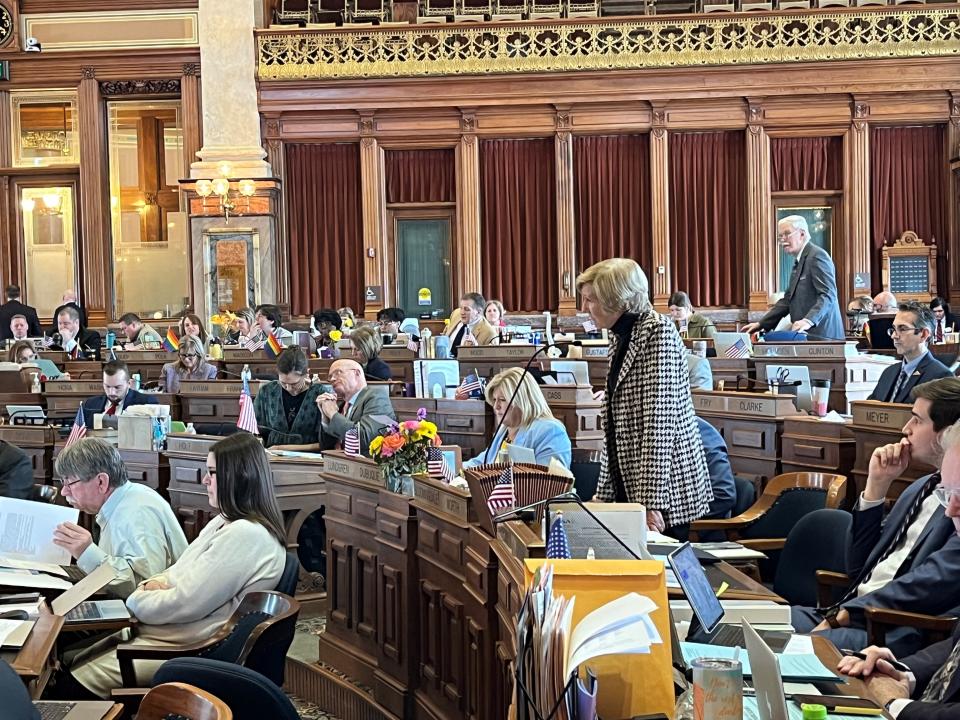6 key takeaways from Iowa's 2024 primary elections
With Tuesday's primary elections, Iowa's major parties know who will be representing them in November's general elections for U.S. House and state Legislature, as well as some county-specific seats.
There were few mysteries in this year's primary cycle, particularly with no statewide races on the ballot such as governor or U.S. Senate. Perhaps the most shocking thing on election night was the line of severe storms that rolled through, reaching Des Moines as polls closed — and they were shocking only in the electrical sense.
Only about 8% of Iowa's registered voters participated in Tuesday's primaries — one of the state's lowest turnouts in recent history.
Nevertheless, this relatively quiet primary election produced troves of data to pore over. Here's what stood out to us after reviewing the counted votes.
2024 Iowa Primary Election: Live Results and Maps
Miller-Meeks, Feenstra find themselves pressed by right-wing challeges
Primary challenges for Iowa's U.S. senators and representatives don't happen often, and when they do, the incumbent typically wins by a large margin.
Chuck Grassley, David Young and Dave Loebsack have all dispatched challengers for U.S. seats by margins of 46 points or more in recent years. Even Steve King, the only one of Iowa's U.S. representatives to lose a primary challenge in recent memory, defeated challengers in 2016 and 2018 before finally ceding his seat to Randy Feenstra in 2020.
But this year, businessmen David Pautsch and Kevin Virgil both mounted credible challenges in Iowa's 1st and 4th congressional districts, respectively, each coming closer to knocking out the incumbents than any other primary challengers since 2010 (excluding Feenstra).
Both challengers ran to the right of the incumbents, arguing that their opponents hadn't done enough to serve conservative voters in their districts.
The messaging took hold in at least some pockets: Pautsch won five of the 1st District's 20 counties in his race against Rep. Mariannette Miller-Meeks; Virgil won nine of 36 counties in the 4th District against Feenstra.
That wasn't enough to earn an unlikely victory. Miller-Meeks and Feenstra both ended up winning their races by double-digit percentage points.
Their attention will now turn to the general election, where both candidates will face rematches from 2022. Miller-Meeks will square off with Christina Bohannan, whom she defeated by about 7 percentage points. Feenstra will face Ryan Melton after earning more than two-thirds of the vote two years ago.
More: US Rep. Mariannette Miller-Meeks staves off David Pautsch in 1st District GOP primary
The relatively close primaries may raise some eyebrows ahead of November's general election, but Melton will have considerable ground to cover to catch Feenstra in the 4th District, Iowa's most conservative, where active Republican voters outnumber active Democrats by a ratio of more than 2-to-1.
In the 1st District, voter registrations have shifted in Republicans' favor since 2022. There are about 17,000 more active Republican voters than Democratic voters in Iowa's southeastern district, where Miller-Meeks is the incumbent.
Baccam takes similar winning path to Nunn in 3rd District
Iowa's only other contested U.S. House primary was on the Democratic side of the ballot, where military veteran and former U.S. Department of Agriculture official Lanon Baccam defeated nonprofit leader and small business owner Melissa Vine in the 3rd Congressional District by nearly 60 percentage points.
More: Lanon Baccam wins Democratic nomination in Iowa's 3rd District, will face US Rep. Zach Nunn
Baccam's opponent in the general election will be Republican incumbent Zach Nunn, who is serving his first term as a congressman. Nunn unseated former U.S. Rep. Cindy Axne in a tight election in 2022, and this year's contest is expected to be similarly close.
Baccam's path would therefore have some similarities to Nunn's two years ago: win a contested primary and then face an incumbent in November.
The margin of victory for Baccam's win Tuesday was greater than that of Nunn's in the 2022 Republican primary … but Baccam's opponent, Vine, struggled to keep up with fundraising and was fined after an ethics complaint.
Nunn, meanwhile, had a greater turnout in his primary two years ago, but turnout was down across the state this year, with no statewide races on the ballot and severe weather in the evening.
Cheatom Park helps propel Johnson to victory in House District 34
While the Democrats' U.S. House races were not particularly competitive, one of the party's Iowa House races was among the closest in the state on election night.
In House District 34, which includes parts of Des Moines north of I-235 around the Des Moines River, pastor and community activist Rob Johnson won a wide-open race to replace the retiring Rep. Ako Abdul-Samad.
Johnson's closest competition, teacher Samy El-Baroudi, fared well in much of the district, outperforming Johnson in half of its precincts, primarily in the north and west.

But Johnson had a strong core of support in the Cheatom Park neighborhood, just north of I-235 between MLK Parkway and the Des Moines River. Johnson's margin of victory over El-Baroudi in the neighborhood was more than 50 percentage points, propelling him to a narrow win in Tuesday's election.
Cerro Gordo County fuels tight legislative races
No incumbent state legislators lost primary challenges Tuesday. But a handful survived close calls, including in Senate District 30, where incumbent Waylon Brown defeated challenger Doug Campbell by fewer than 300 votes, or about 5 percentage points.
The district includes parts of Cerro Gordo, Floyd, Mitchell and Worth counties in northern Iowa, around Mason City.
In the same part of Iowa is House District 60, where incumbent Jane Bloomingdale defeated challenger John Rosenfeld by about 600 votes.
Cerro Gordo County voters were a driving force behind the challengers in both races. In each, about 55% of voters in the county selected the challenger. But about two-thirds of voters in the districts' three other counties sided with the incumbents, enough to overcome their Cerro Gordo deficits.

A similar story played out in one of the closest legislative races of the night: House District 7, covering parts of Calhoun, Pocahontas, Sac and Webster counties.
About three in four Republican voters in Sac County cast their ballots for challenger Wendy Larson, but incumbent Mike Sexton won the rest of the district by 19 points — resulting in a Sexton win by less than 60 votes.
Results for that race, as in all others from Tuesday's primary elections, are preliminary and unofficial until certified by the county auditors.
Ankeny voters help defeat Polk County supervisor, a former Ankeny mayor
Legislative races didn't produce any primary upsets, but one incumbent fell in a Des Moines-area county supervisor race.
Republican Steve Van Oort, a three-term incumbent, lost to Ankeny Mayor Mark Holm in Tuesday's primary election for Polk County supervisor in District 3. Van Oort is a former Ankeny mayor and City Council member and still lives in the city.

More: Polk County election results: Supervisor Steve Van Oort loses primary race to Ankeny mayor
District 3 primarily covers Ankeny and Altoona — in fact, about 80% of the voters in the primary were Ankeny residents.
Holm handily won the battle for Ankeny, earning more than 70% of the vote from Ankeny-area precincts.
But he also earned about 63% of the vote from precincts outside of Ankeny, resulting in a victory of about 38 percentage points over the incumbent.
Tim Webber is a data visualization specialist for the Register. Reach him at [email protected] and on Twitter at @HelloTimWebber.
This article originally appeared on Des Moines Register: 2024 election: What stood out from Iowa's primary election results
Solve the daily Crossword

